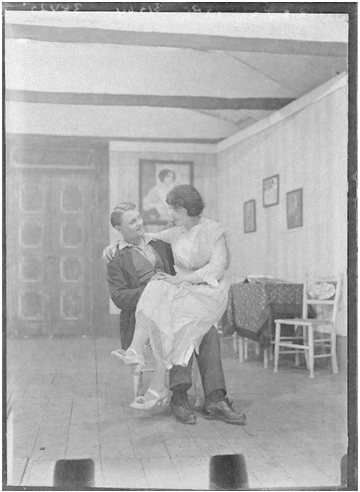Thu, 01 Mar 1917
And yet there were some unlikely females within the camp – here the description of stubble pushing through the grease paint of a “mademoiselle”, a female impersonator, and a few other thoughts about missing the fairer sex.
“Camp Stars II”
From Issue 5 of the Lager Zeitung newspaper dated 1 March 1917
“There are many kinds of stars. Innumerable kinds, but, since we are not skilled astronomers, and also because for the moment it suits our purposes better, we will divide them into just two categories: those stars which shine brightly, and the other kind, whose radiance is scarcely discernible to the naked eye. In our last issue we dealt with camp stars which shine with the highest degree of brilliance. Today we shall address ourselves to the lesser lights whose gentle glow illuminates our theatrical firmament. We are referring to the honky-tonk artistes. Perhaps it is not appropriate to call them lesser lights, because, as everyone knows, a star which appears small may in reality be large, larger than Jupiter, Venus and the whole astronomical panoply. How often does modesty conceal true greatness? But it is best that we do not scrutinise either the great heavenly lights, or the lesser lights of the camp, with a telescope (an instrument which we are, anyway, not permitted to possess) otherwise we should see, on the cheek of Mademoiselle X, the horrid stubble protruding through the greasepaint, thick as cress in the cigar box, leaving us impoverished, being deprived of an illusion.

Two male internees in a theatre production
PG/7870/38725 courtesy of Manx National Heritage
“Naturally, the female impersonators are the main attraction for the audience, and if we made known our views to them, we did it out of our natural sense of courtesy. We realise that this is an opportunity to say something about women in general. We miss them terribly, the fair shepherdesses of the past, but less keenly than the self-regarding members of the fair sex might suppose. How, in happy times, did we pity the poor monks, who passed their chaste days and nights in abstinence, abjuring love! It seemed to us then that even the lavish abbey cuisine and the well-stocked wine cellar offered but a poor compensation for the lack of love. But today! Ask any long-time internee in any country in the world which he would prefer, a gourmet dinner at the Adlon, the Ritz or the Bristol, with all the delights of its wine list and selection of Havana cigars, - or a kiss? In our view, a latter-day Hercules at the crossroads would opt for the gastronomic banquet. Provided of course that his Old Dutch never caught wind of it – she who has been standing with her lips sweetly pursed for his kiss for over 2 years. But no benevolent deity confronts us with this dilemma.
“How often have we been asked, both in Stobs and here, to refrain from such frivolous reflections, and instead to give this rag a touch of solidity and permanence – oh, and a chess section, too. Sure, it’s a great idea. But fleeting and transient is our mentality, like our abode, and we always had a certain passion for logic.”
With their wide circulation, copies of Knockaloe and other internment camp newspapers can be found in private collections, archives and libraries around the world. The Copies above were obtained as follows:
• Issue 1 of the Lager - Zeitung newspaper dated October 1916, held within a private collection
• Issue 2 of the Lager - Zeitung newspaper dated 18 November 1916, held within the American Swarthmore College Peace Collection. Date accessed 2 March 2016 https://wwionline.org/resources/institutions/swarthmore-college-peace-collection/
• Issue 5 of the Lager - Zeitung newspaper dated 1 March 191718 November 1916, held within the American Swarthmore College Peace Collection. Date accessed 2 March 2016 https://wwionline.org/resources/institutions/swarthmore-college-peace-collection/
Fri, 01 Mar 2024

Tue, 06 Feb 2024

Sat, 11 Nov 2023
__________wi40he40mocropbgwhite.jpg)
Tue, 22 Aug 2023